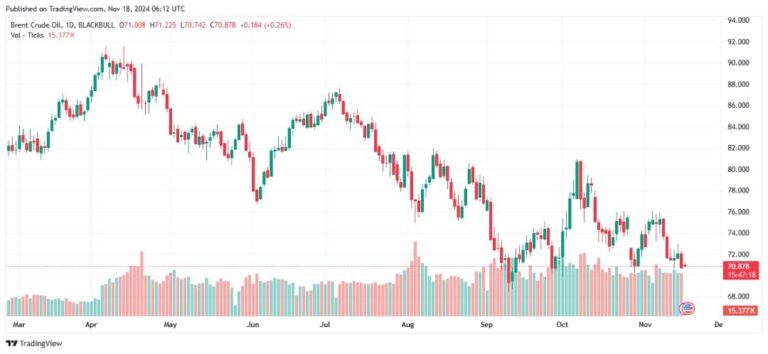Research Analyst
Oil prices showed little movement Monday as stronger Chinese factory activity boosted demand optimism, countered by concerns over U.S. interest rate policy and Middle East tensions. Brent crude slipped 1 cent to $71.83, while WTI rose 10 cents to $68.10.
Traders focused on OPEC+’s upcoming Dec. 5 meeting and fragile ceasefire developments between Israel and Lebanon, which could further impact market dynamics.
China’s Factory Growth Hits 5-Month High On Strong Orders
China’s manufacturing activity surged in November, with the Caixin/S&P Global PMI climbing to 51.5, its highest since June, driven by robust domestic and export orders. While optimism among manufacturers reached an eight-month high, hiring remained cautious, and rising input costs led to higher selling prices. Analysts note that economic recovery needs further support despite signs of stabilization.
UK Manufacturing Hits 9-Month Low Amid Rising Costs, Weak Demand
The S&P Global Manufacturing PMI fell to 48.0 in November, marking the sharpest contraction in UK manufacturing in nine months. Falling orders, higher costs, and global trade uncertainties weighed heavily on the sector.
Small businesses bore the brunt, with steep declines in output and exports. Key challenges included increased employment taxes, a 7% minimum wage hike, and potential tariffs, prompting investment delays and cancellations.
Orders, output, and employment dropped at their fastest pace since February.
Cameroon To Cut Fuel Subsidies by 90% in 2025
Cameroon plans to slash fuel subsidies by over 90% in 2025, reducing them from 263 billion CFA francs ($424 million) to 15 billion CFA francs ($24 million), in line with IMF recommendations.
This move, the third subsidy cut since 2023, aims to improve fiscal management but may increase inflation and put further pressure on consumers. Economic expert Jean Cedric Kouam suggested long-term benefits like better resource use and sustainable energy.
Prime Minister Joseph Dion Ngute forecasts 4.1% economic growth for 2025, with inflation easing to 4%, though new measures to support citizens remain uncertain.
Nigeria Issues $500m Eurobond To Address 2024 Budget Deficit
Nigeria has issued $500 million in 6.5-year bonds and a 10-year benchmark bond to finance its 2024 budget deficit. The Eurobond, yielding 10.125% and 10.625%, is the first since 2022 and will settle on December 9, 2024.
The bonds, listed on the London Stock Exchange and structured in 144A/Reg S format, are accessible to global investors. Managed by Citigroup, Goldman Sachs, JPMorgan, Standard Chartered, and Chapel Hill Denham, proceeds will address fiscal gaps caused by low oil revenues and weak tax collection.
This move follows a $900 million domestic bond sale in September and reflects a regional trend as African nations reenter global debt markets.








